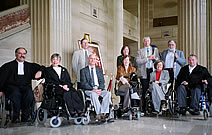Act Now

Empower U: Learn to Access Your Disability Rights Training on Canadian Human Rights, the Convention on the Rights of Persons with Disabilities (CRPD) and its Optional Protocol (OP) training aims to increase awareness of how to address discrimination using more familiar Canadian human rights laws such as Human Rights Codes and the newer international Convention on the Rights of Persons with Disabilities (CRPD). This is training for persons with disabilities by persons with disabilities. The training is part of a project funded by Employment and Social Development Canada and implemented by the Council of Canadians with Disabilities (CCD) in collaboration with Canadian Multicultural Disability Centre Inc. (CMDCI), Citizens With Disabilities – Ontario (CWDO), Manitoba League of Persons with Disabilities (MLPD) and National Educational Association of Disabled Students (NEADS). Read more.
Sign Up for our monthly digest
A monthly newsletter from CCD about what is happening in the community
Reaction to Landmark Canadian Transportation Agency Decision: Disabled Canadians Jubilant to Have Transport Barrier Removed
Related Documents
October 4, 2024
International Air Transport Association v. Canada (Transportation Agency)
October 4, 2024
WIN FOR INTERNATIONAL AIR TRAVELLERS
November 13, 2023
I was parked luggage: Accessibility advocates speak out about demeaning air travel
For Immediate Release | January 10, 2008
WINNIPEG, January 10, 2008—Today the Canadian Transportation Agency (CTA) released a landmark decision concerning the right of individuals with disabilities to travel by air without having to pay for a second seat, for an attendant or other use, to accommodate their disability. In a historic decision in the "One Person, One Fare" case, the agency has recognized the right of these individuals to have access to a second seat when traveling by air in Canada without having to pay a second fare.
"Canadians with disabilities are celebrating today," said Pat Danforth, Chairperson of the Council of Canadians with Disabilities Transportation Committee. Joanne Neubauer, one of the principal complainants in the case, agreed. "We hope that this decision sends a strong message to all transportation carriers," she said. "Access is the rule."
The CTA decision acknowledged the importance of a number of established human rights principles underlying the arguments of the complainants in the case, noting that these principles dictate that persons with disabilities have the same rights as others to full participation in all aspects of society and that equal access to transportation is critical to their exercise of that right.
"The Canadian Transportation Agency recognized the fundamental soundness of our arguments, which have a strong foundation in existing human rights jurisprudence," said David Baker of bakerlaw, legal counsel for the complainants in the case. "While the number of people who will benefit and the actual cost to the airlines are larger than in any previous case, the principles applied by the Agency in its decision were clearly established by the Supreme Court of Canada in its March 2007 CCD v. VIA Rail decision," said David Baker.
Disabled Canadians said the decision had the potential to make an enormous difference in their lives. "This is about independence," said Sandra Carpenter of the Centre for Independent Living in Toronto. "It's about our ability to be part of Canadian society and to have barriers to our participation removed."
The decision was many years in coming—the late Eric Norman, Joanne Neubauer, and the Council of Canadians with Disabilities filed the original complaint with the CTA in 2002, seeking to establish a situation of equality for passengers with disabilities who travel with attendants.
For many years, Canadians with disabilities traveling by train, bus or marine service have been permitted to use a second seat without cost when one was required. But airlines such as Air Canada, Westjet, and Jazz have not been bound to obey this policy, meaning that many Canadians with disabilities have been forced to effectively pay double what others pay to fly.
Now that all seems set to change.
"We have been looking for some good news in the transport industry for some time," said Claredon Robicheau, a member of the Council of Canadians with Disabilities (CCD) Transport Committee. "This decision gives us enormous hope that we are once again moving to build an accessible and inclusive Canada."
-30-
For More Information or Comment on the Decision Contact:
- Mr. David Baker, Legal Counsel
Ms. Sandra Carpenter, Acting Executive Director - Centre for Independent Living in Toronto
- 416-533-0040 Ext 222
- 416-599-2458 Ext 36
- Ms. Joanne Neubauer
- 250-881-1936
- Mr. Jim Derksen, CCD Policy Advisor
- 204-781-4187
- Ms. Pat Danforth, Chair Transportation Committee
- 204-947-0303
- Mr. Laurie Beachell, National Coordinator CCD
- 250-595-0044
- Mr. Claredon Robicheau, Member CCD Transportation Committee (available for French interviews)
- 902-769-2474

CCD wins VIA Rail case at the Supreme Court of Canada on March 23, 2007.
